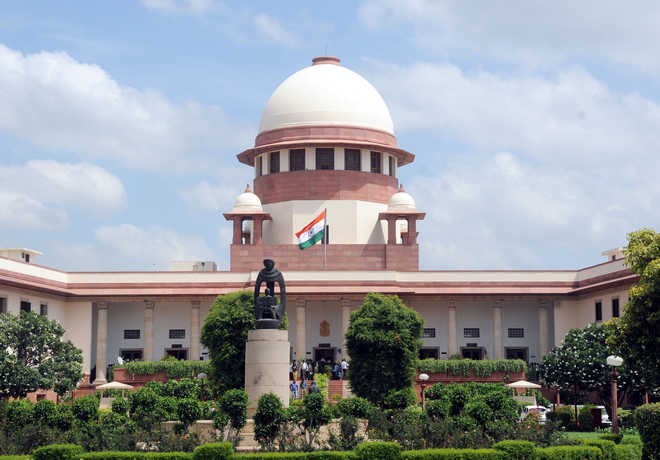
Satya Prakash
Tribune News Service
New Delhi, May 15
Taking strong exception to the Supreme Court’s attempt to examine if triple talaq was an essential practice in Islam to decide its validity, the NDA government on Monday asserted that the practice had to be tested on the touchstone of constitutional principles of equality and non-discrimination alone.
(Follow The Tribune on Facebook; and Twitter @thetribunechd)
"Your job is not to interpret the Quran. You are not an ecclesiastical court to check whether a practice is essential to Islam or not," Attorney General Mukul Rohatgi told a five-judge Constitution Bench headed by Chief Justice of India JS Khehar.
“You are approaching the problem of triple talaq from the wrong end,” the Attorney General told the bench. "What religious practices are essential to a particular religion or faith is difficult to define for this court,” he added.
Rohatgi’s submission came in response to the CJI’s insisting that the government first address the bench whether triple talaq was essential to Islam or not.
"Let's say, tomorrow you declare that triple talaq is not an essential part of religion. So what? Nothing... You have to first decide whether this practice is against constitutional morality or not," Rohatgi told the bench, adding constitutional morality included secularism, human dignity and non-discrimination. "What may be permissible for society may not be constitutionally moral,” he submitted.
Describing all three forms of triple talaq — talaq-e-biddat, talaq-e-hasan and talaq-e-ahasan — as "unilateral, extra-judicial, unequal", the Attorney General demanded that they should be declared unconstitutional altogether and not just the instantaneous form of triple talaq i.e. talaq-e-biddat.
Earlier, senior counsel Ram Jethmalani and Indira Jaising had attacked all forms of triple talaq on the ground that they were extra-judicial, arbitrary and essentially discriminated against Muslim women who didn’t have such a right.
Responding to a court’s query as to what will happen in such a situation, Rohatgi said the Centre would enact a new divorce law if as the "guardian of the Constitution" the top court took such a decision.
CJI Khehar said the Supreme Court was not only the guardian of the Constitution but also the guardian of the minorities and the matter involved "tinkering with religion itself".
Rohatgi said issues of marriage, divorce and inheritance were not essential part of right to religion which covered only belief, religious practices and rituals. He, however, said even if triple talaq was an essential part of religion protected under Article 25; it would still be constitutionally immoral and impermissible.
"Article 25 is subject to all other fundamental rights. So no matter whether a practice is essential to religion or not, triple talaq has to abide by the principles of gender equality," Rohatgi contended.
As the CJI said tenets of a religion can neither be tested on scientific grounds or on other grounds, the Attorney General shot back, “What would the court do if someone came says ‘Sati’ is an essential part of Hinduism?”
Rohatgi insisted that the issues referred to the Constitution Bench had to be decided on the touchstone of constitutional principles alone.
"Tell us why are we here before a Constitution Bench if we cannot open the Constitution? Matters are referred to the Constitution Bench because they have something to do with the Constitution," he said.
Batting for equal rights for Muslim women, the Attorney General objected to the CJI’s comment that "Women should be equal, but within the particular religion."
Rohatgi said: “One half of a community (Muslims) suffers inequality from the male counterpart of the same community… How can you shut your eyes to it? Women in India are marching shoulder-to-shoulder with men in every field. We are before a Constitution Bench and you cannot shut your eyes to their constitutional rights of equality and gender justice."
The bench – also comprising Justices Kurian Joseph, Rohinton Nariman, UU Lalit and S. Abdul Nazeer, said it would interfere only if the State discriminated against rights of Muslim women and not when private persons did it as fundamental rights of equality and non-discrimination were essentially rights against the State.
Responding to the court’s proposition, Rohatgi said practices of Muslim marriage and divorce had been codified as "Muslim law" under Section 2 of ‘The Muslim Personal Law (Shariat) Application Act, 1937’. He said the 1937 Act being a law within the meaning of Article 13(3) of the Constitution can always be tested on the touchstone of the fundamental right to equality, right against non-discrimination, right to live with human dignity, gender justice and human rights.
Additional Solicitor General Tushar Mehta requested the court to expunge certain objectionable submissions of the All India Muslim Personal Law Board against women.
They clarified that due to paucity of time it would not go into the issues of polygamy and nikah halala which would continue to remain before the Constitution Bench to be decided later.
Senior counsel Kapil Sibal commenced his arguments on behalf of AIMPLB and would continue on Tuesday.



























